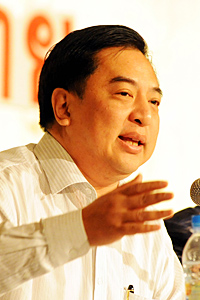
Prime Minister and head of the National Council for Peace and Order (NCPO) Gen Prayut Chan-o-cha finally rid the Bangkok Metropolitan Administration (BMA) of its last elected governor, MR Sukhumbhand Paribatra. The dismissal order came a little less than two months after he suspended the governor over investigations into alleged irregularities at the BMA.
MR Sukhumbhand is replaced by his deputy, Pol Gen Aswin Kwanmuang, who at one time was the Metropolitan Police chief. He became the first appointed governor in 31 years and the first policeman in the job.
A few observations can be made.
Gen Prayut probably wanted to fire MR Sukhumbahnd from the very beginning but was reluctant, despite the governor's low popularity. This was because MR Sukhumbhand is well connected and has a social status to be reckoned with. Also, he is a close ally of Suthep Thaugsuban, ex-Democrat Party secretary-general and the former leader of the People's Democratic Reform Committee (PDRC), the whistle blower movement that led to the toppling of Yingluck Shinawatra's government in 2014. His suspension was a Thai way of compromising.

Suranand Vejjajiva was secretary-general to the prime minister during the Yingluck Shinawatra government and is now a political analyst.
However, although the suspension, which spared MR Sukhumbhand's four deputies, temporarily addressed a political matter, it did not serve the immediate concern of the NCPO or the long-term administrative issues of a large metropolis that is home to at least 10 million residents.
During the floods that threatened the city last month, it seemed the BMA was its usual incompetent self, appearing half-hearted in its management. Nevertheless, the NCPO was upset when it took most of the blame from Bangkokians.
With the passing of His Majesty King Bhumibol Adulyadej, the generals are under more pressure. Royal religious rites and functions need to be organised at the Grand Palace and Sanam Luang.
Each day, tens of thousands of people are expected to be in the area to pay homage to the late King. Foreign dignitaries are starting to arrive. The construction of a royal cremation pyre and other structures at Sanam Luang must be completed within a year.
To effectively complete such momentous tasks, together with handling the necessary security measures, a proficient team comprising members from both the national and Bangkok administrations is required.
But the four deputies lack the authority to do anything beyond day-to-day routines. A full-time governor is needed, and that's where Pol Gen Aswin, assuming he is the right man for the job, comes in.
A former Metropolitan Police chief and deputy police commissioner, he was popular and widely known as a crime buster. After his retirement four years ago, he was asked to become deputy Bangkok governor by Mr Suthep.
He is well connected with the military and politicians, and certainly knows how national bureaucracy and politics work. He has the experience of running a city and knows the ins and outs of the BMA.
Coupled with his police background, he will be an asset in setting up security details. Any other person would have to learn the ropes all over again, which would waste too much time.
But this does not mean the NCPO, Gen Prayut and Pol Gen Aswin should be given carte blanche.
First, Gen Prayut must state whether a new gubernatorial election will be held within 60 days after the supposed end of MR Sukhumbhand's elected term in March next year, or whether he will extend the appointment period to allow Pol Gen Aswin to remain in power indefinitely.
According to the government's roadmap to democracy, the new constitution should be in effect by March next year. The roadmap should include timetables for local elections including those for Bangkok.
Secondly, despite his competency as a City Hall manager, Pol Gen Aswin is viewed by many as supportive of Suthep and the PDRC movement.
Will he also be used as a political tool to block the opposition and help political parties favourable to the current regime in the scheduled general elections next year?
There are no assurances seeing as checks and balances do not exist. All branches of the government nationally and locally are appointees of the NCPO.
Thirdly, City Hall actually needs reform. Bangkok is blessed with historical heritage. Over decades it has built itself into the modern economic centre of the region. But its infrastructure is inadequate. Traffic remains horrendous even with new mass transit systems; its sidewalks are not convenient for pedestrians; there are no bike lanes viable enough to provide transport alternatives.
Floods during the annual rainy season continue to threaten city dwellers. Bangkok is sinking, as warned by academics, yet no effective measures and long-term solutions have emerged.
Even the electrical and telephone wires bundled and tangled in large knots along the roads became a global incident after Bill Gates posted a photo of them on line. The building codes need to be revised to ensure safety and energy efficiency.
One cannot totally blame the BMA. Most government agencies responsible for solving Bangkok's woes do not work under the BMA, but report to the central government. It could be a nightmare for City Hall to try to coordinate with these agencies and get things done.
Many academics and futurists view the next century as being dominated by mega-metropoles. If Bangkok wants to be a key player and remain the regional centre of economic development, it is time to set the agenda of reform for our capital.
Next year, the NCPO and the new governor will have to put time and effort into organising the historic royal funeral ceremony.
They have the opportunity to set the city's reform in motion before the country's return to a democratic government.
Both Gen Prayut and Pol Gen Aswin's success or failure in steering the city's administration will be evaluated by how well they handle both.
